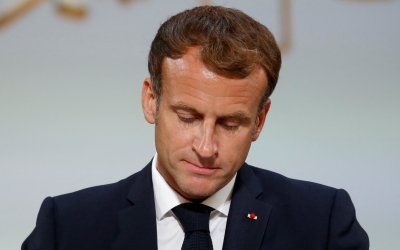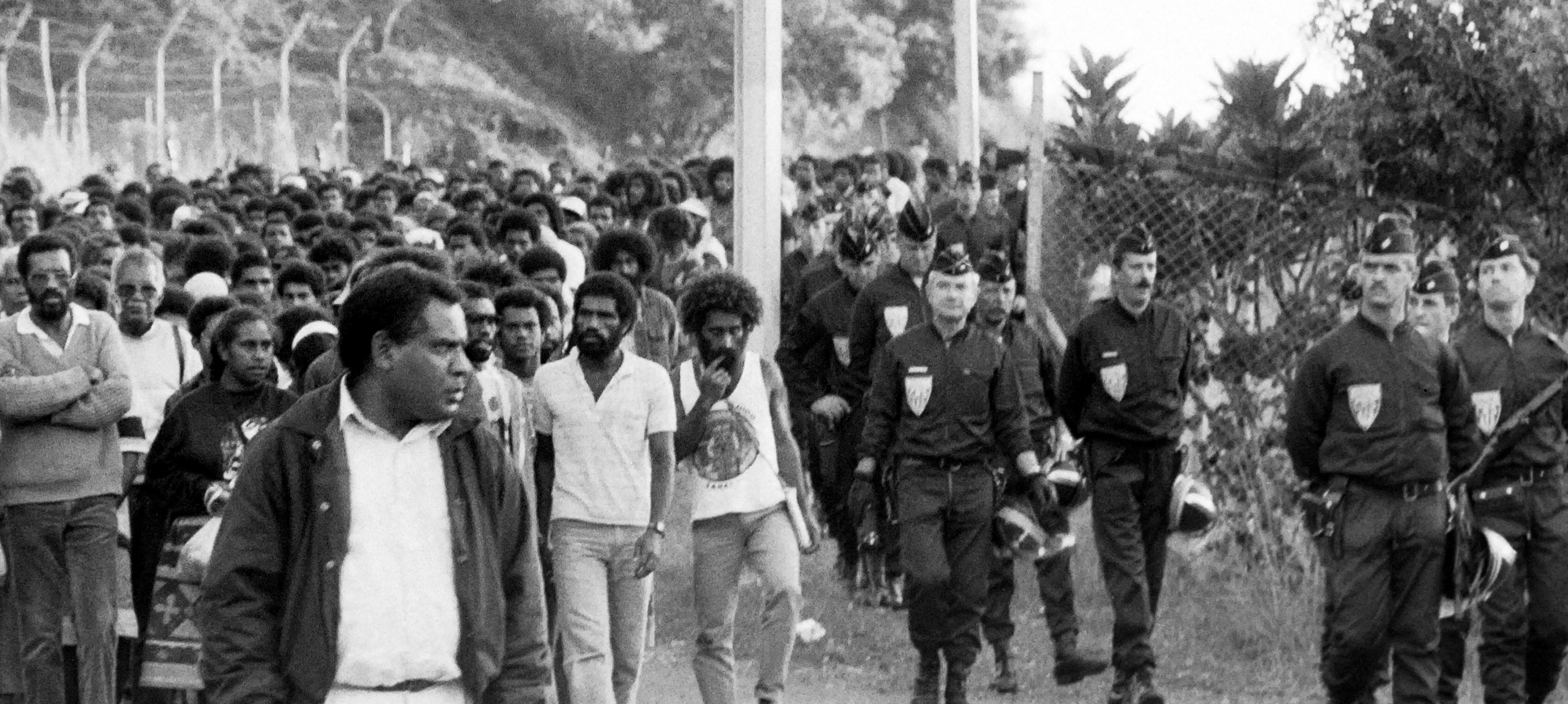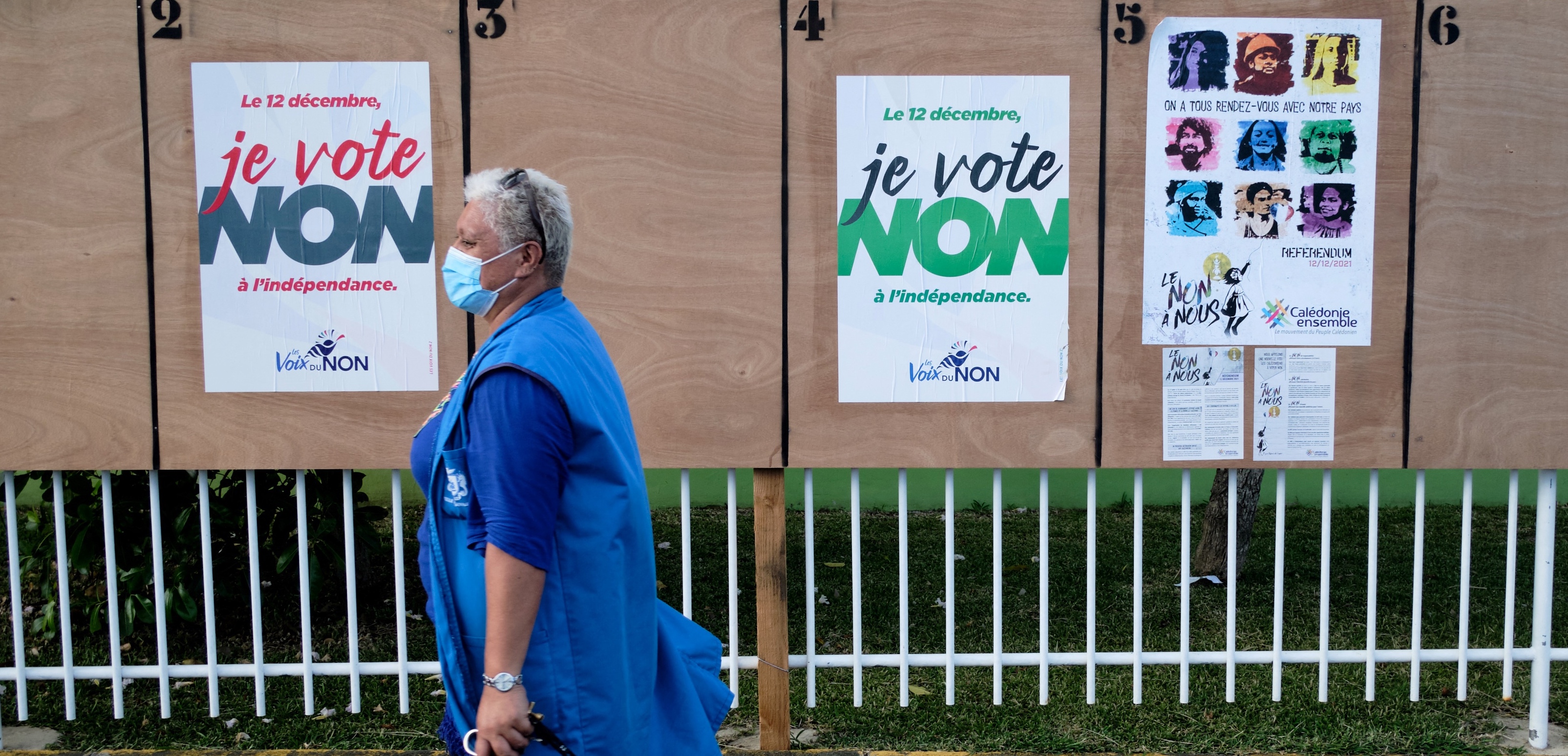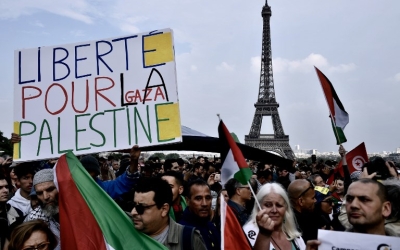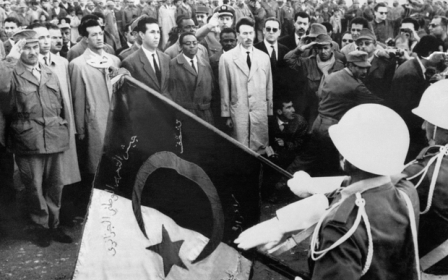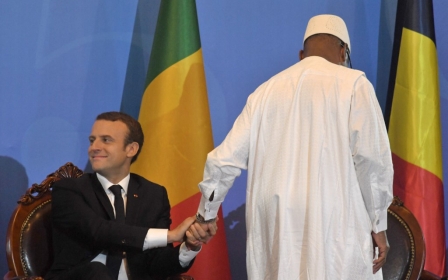New Caledonia referendum: France's last pocket of settler-colonialism
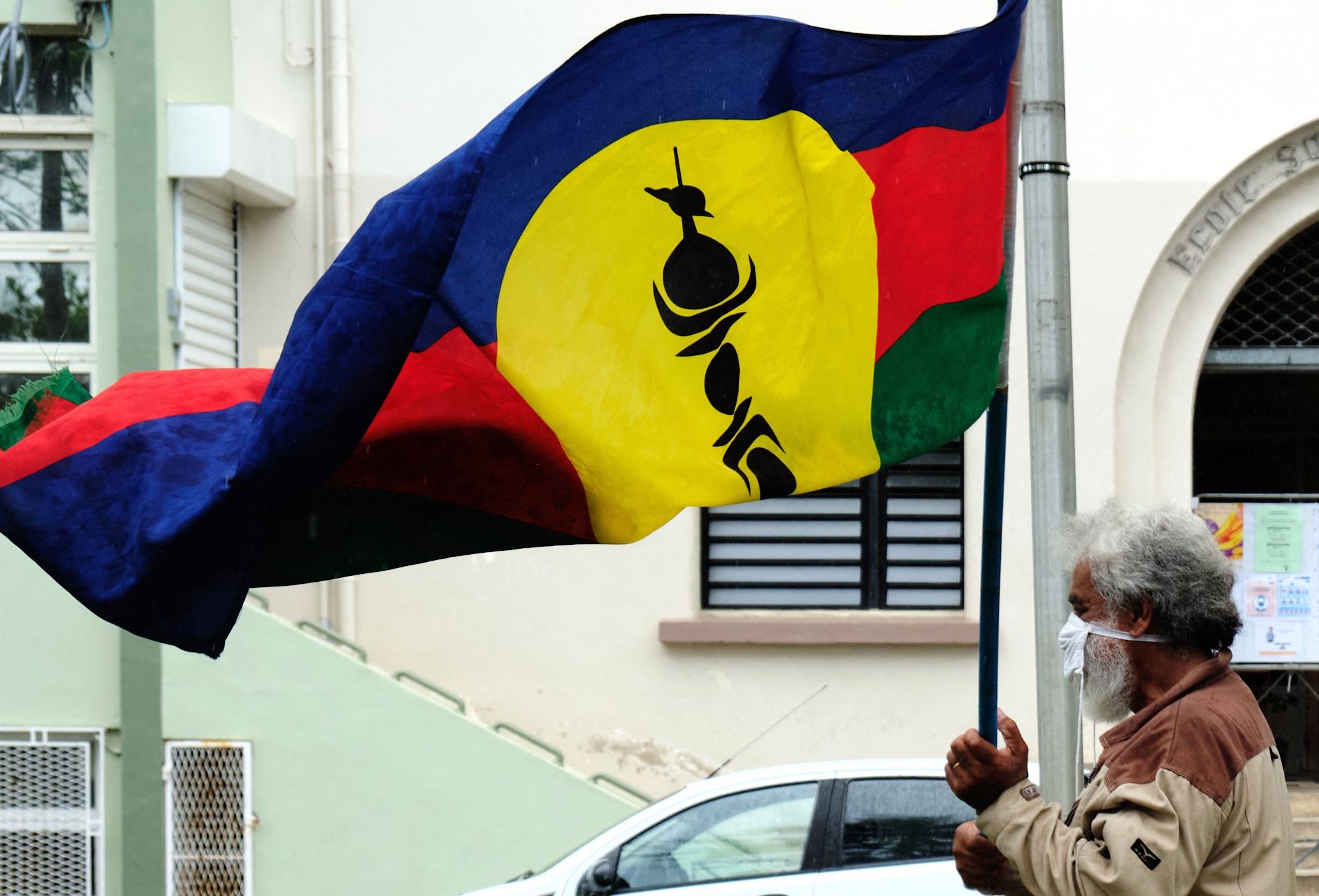
This week’s independence referendum in Kanaky, or what France calls "New Caledonia", was boycotted by the majority of the indigenous Kanak people in contrast with a majority of white colonists who participated.
Its expected result was a defeat for the cause of independence. It seems that European settler-colonies remain beholden to the white colonists, not only in the larger white settler-colonies in the Americas and Oceania, but also in the smaller ones, whether in the South Pacific, Southern Africa, Palestine, or Hawaii.
New MEE newsletter: Jerusalem Dispatch
Sign up to get the latest insights and analysis on Israel-Palestine, alongside Turkey Unpacked and other MEE newsletters
North of New Zealand and east of Australia lies a small group of Melanesian islands that Captain James Cook visited in 1774. However, it was not the British who took them over but the French, in 1853, who claimed New Caledonia as a colony.
The indigenous Kanaks, who had welcomed Cook and later the French, were attacked and killed by the French who referred to them as "savages".
As the French stole Kanak land and introduced cattle which ravaged Kanak farmland, enslaved many Kanaks to work for them without pay, and built mines to extract metals (especially nickel), a number of resistance attacks targeted the French between 1853 and 1878.
Some of the Kanak leaders, who were likened in the 1860s to Algerian resistance leader Amir ‘Abd al-Qadir, were exiled to Tahiti, while others were coopted to work with the French against other clans. In 1867, a dozen Kanaks were beheaded by guillotine for attacking French gendarmes.
A penal colony
In 1868, the French put the Kanaks in reservations and expropriated huge tracts of their land. European diseases decimated the Kanak population, who numbered about 42,000 people in 1887, already a major decline since the arrival of the French, though estimates of the population in the 1840s are not available.
In 1901, Kanaks numbered 28,000, having declined by one third. The French expected them to die off in ten years. Their numbers did not increase again until the 1930s and reached 42,000 only in 1963.
After slaughtering thousands of French citizens who defended the Paris Commune in 1871, the French exiled almost 4000 surviving communards to New Caledonia, declared a penal colony in 1863.
In addition to a total of 20,000 convicts transported to New Caledonia between 1871 and 1908, 2000 Algerians were exiled there for participating in the al-Muqrani uprising of 1871, put down with genocidal ferocity by the French.
The Israeli connection
In 1878, the Kanak staged an uprising against the French colonial settlers and French colonisation. They killed 200 settlers while the French killed 1200 Kanaks, and deported another 1000. The Kanaks were placed in reservations and their lands distributed to the Communards. The French called the insurrection a war of "savagery against civilization".
The French expropriated even more Kanak land under the justification, often used by the Israelis to confiscate Palestinian land, that 'the native is not the owner of the land'
In 1894, the French expropriated even more Kanak land under the justification, often used by the Israelis to confiscate Palestinian land, that “the native is not the owner of the land, and when the French government appropriates the land, it just takes back its own land." Kanaks were then put to work for the white colonists.
In 1896, New Caledonia became a settler-colony, and the islands became open to civilian colonisation.
During World War I, the French forcibly inducted the Kanak into their army, and threatened to burn down their villages if their leaders did not provide "volunteers". Of the 1134 Melanesians who fought in the war for France, 374 died (twice as many as the colonists), more than half from disease.
By 1917, settlers began to steal the last remaining Kanak lands in the highlands, to which the Kanak had retreated, for their cattle to graze. The gendarmes burned the homes of resisting Kanaks, which led to a new revolt during which the Kanak killed 11 Europeans. The French responded by killing 200 Kanak and crushed the uprising.
Apartheid system
In the post-WWI period, New Caledonia reverted to the apartheid system the French had installed in the late 19th century. Forced labour and pass laws remained in effect. In 1934, a ten-franc reward was paid for those reporting on a native found in an "irregular situation" - laws not dissimilar to those "pass laws" Israel imposed on the Palestinians inside Israel between 1948 and 1966.
French, the language of instruction in missionary schools, became compulsory in 1923 in state schools. Already, by the end of WWI, the majority of Kanak spoke the language of their oppressors. They remained confined to agriculture.
As in the French colonies in Africa whose populations were inducted in France’s wars, during WWII, the Kanak were called upon again to serve. The white colonists, Kanak, and the Tahitians served in a "Mixed Pacific Battalion" including in the liberation of France itself in 1944.
The French constitution of 1946 liberalised colonial rule, but refused to grant suffrage to the Kanaks until 1957. The white colonists were horrified and called for an increase in white colonisation. The French heeded their call, and colonists from France continue to pour into New Caledonia today, especially, since, as civil servants, they earn double the amount they would in France.
Independence calls
By the late 1970s, calls for independence were adopted by Kanak political parties which joined together in 1984 in the Kanak Socialist National Liberation Front (FLNKS). Their call for independence was opposed by France, the old French colonists known as “Caldoches”, and the more recent colonists called “Métros,” represented in the “Rally for New Caledonia in the Republic.”
The ongoing struggle for the independence of Kanaky, which the French euphemistically dubbed “the events", erupted in 1984 and culminated in 1988 in the killing of four gendarmes and the French "retaliation", which killed 19 Kanaks. In light of the killings, the pro- and anti-independence parties signed the Matignon Accords in 1988 agreeing to a strategy of "peaceful" change.
As with the colonised Palestinians who remain subject to the racialised power of their colonisers, the colonised Kanaks remain subject to the racialised power of the white French colonists
Seeing this as a betrayal, a Kanak dissident killed the leader of the FLNKS, Jean-Marie Tjibaou, and his deputy in 1989, for signing the accords.
In contrast, following the First Intifada of 1987 and the "Oslo Accords" of 1993 that failed to deliver a Palestinian state, the Palestinian Authority has continued its rampage killing of Palestinians who oppose its surrender, a far worse arrangement for the Palestinians than the Matignon Accords are for the Kanaks.
The French began to decentralise power to devolve some of the colonial power to local authority, a process they called "rebalancing". In 1998, the Noumea Accord was signed to increase the pace of autonomy and “integrate” the Kanak in their own colonised homeland for a transitional period of two decades, at the end of which, three referendums would be held to determine whether New Caledonia would gain independence or remain a French colony (something Israel would never allow inside Israel and the Occupied Territories).
The referendum
The 2018 referendum, criticised for its bias against independence, still resulted in 56 percent voting "no" to independence and 44 percent voting "yes", with 81 percent of the electorate participating. In the second referendum in 2020, 47 percent chose independence, a gain of three percent, while 53 percent voted against it, a drop of three percent, with 79 percent of the electorate participating.
The Kanak parties asked that this year’s referendum be postponed due to the latest increase in Covid-19 infections, but President Emmanuel Macron refused, leading to a boycott by the majority of Kanaks.
The results of the vote from this week, in which only 42 percent of the electorate participated, are 96 percent against independence. Macron celebrated the undemocratic outcome, declaring: “France is more beautiful because New Caledonia chose to stay." Macron declared that France is "proud" of this process, which has in effect kept France’s settler-colony intact and its white colonial-settlers dominant over the native Kanaks.
Just as Palestine is the only intact European settler-colony in the Arab world after the end of Italian settler-colonialism in Libya in 1940s and 50s, the end of French settler-colonialism in Morocco and Tunisia in the 1950s, and the liberation of Algeria in 1962 (some of Algeria’s French colonists left to New Caledonia), Kanaky remains the only major country subject to French settler-colonialism after the independence of most of its island neighbours.
As with the colonised Palestinians, who have less rights than those acquired by the Kanaks in the last half century, and who remain subject to the racialised power of their colonisers, the colonised Kanaks remain subject to the racialised power of the white French colonists and their mother country.
No wonder Macron is as ebullient and proud as Israel’s leaders.
The views expressed in this article belong to the author and do not necessarily reflect the editorial policy of Middle East Eye.
Middle East Eye delivers independent and unrivalled coverage and analysis of the Middle East, North Africa and beyond. To learn more about republishing this content and the associated fees, please fill out this form. More about MEE can be found here.



